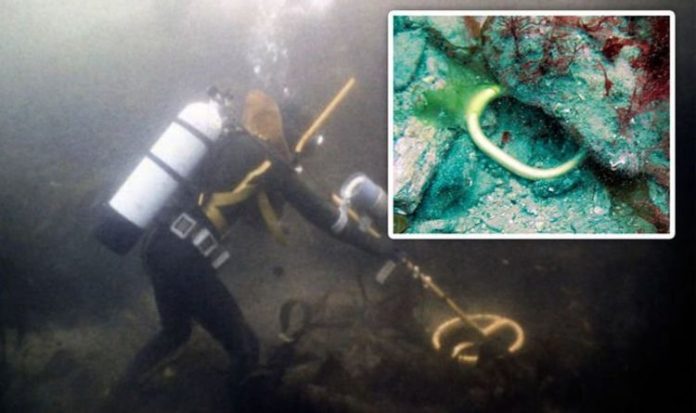The vessel, carrying copper and tin ingots used to make weapons and jewellery, sank off the coast near Salcombe in Devon and is thought to date back to 900BC. It was discovered by the South West Maritime Archaeological Group after a team of amateur researchers brought its cargo to the surface. The goods – 259 copper ingots and 27 of tin – were believed to be destined for Britain but collected from several different sources in Europe.
The discovery – which is one of the oldest ever – revealed the high level of sophistication maritime trade in Europe had reached, even in ancient times.
The find as a whole is testimony to the incredible seafaring capabilities of prehistoric Britons.
A bronze sword and three gold wrist bracelets, known as torcs, were also found at the spot, but the main body of the ship is thought to have perished.
A Bronze Age settlement is known to have existed close to where the wreck was found – the boat was probably attempting to land there when disaster struck just 300 yards from the shore.
The waters around this stretch of the Devonshire coast are notoriously treacherous.
Researchers theorised it was likely to have been powered with paddles and had a crew of around 15.
Engineer Jim Tyson, who took part in the dives, said in 2010: “You have something in your hands that had not seen the light of day in 3,000 years.
“The last person to do so must have died in the shipwreck.
“It shows definite communications and trade – these people were trading as we would these days.”
READ MORE: ‘Oh my God, something’s in there!’ Major Great Pyramid discovery exposed by archaeologist
The British Museum took charge of the artefacts and valued them before giving the team a sum, which was not disclosed.
Experts at the University of Oxford are analysing the cargo to establish its exact origins.
Ben Roberts, a Bronze Age expert, told the Sunday Telegraph: “It is an incredibly exciting find.
“What we have here is really, really good evidence of trade. We don’t get many shipwreck sites.
“It is very rare to get a snapshot of this level of activity. It is very possible there were also animals and people going across the Channel too.
“We hardly ever get to see evidence of this cross Channel trade in action. It is a huge amount of cargo.”
Devon’s coast is full of shipwrecks both old and new that have washed up over the years.
The nearby Salcombe Cannon wreck, which is protected, previously yielded Europe’s largest collection of 17th-century Moroccan gold coins.
Another vessel dating back to the Bronze Age had earlier been discovered in Salcombe but was only found to hold 53 artefacts.
The team got their first hint about the latest ancient haul when small pieces of copper were found on the seabed.







